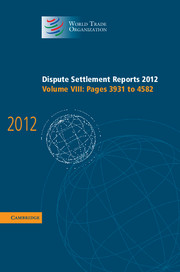Book contents
- Frontmatter
- Contents
- China — Measures Related to the Exportation of Various Raw Materials (WT/DS394, WT/DS395, WT/DS398)
- PHILIPPINES - TAXES ON DISTILLED SPIRITS
- PHILIPPINES - TAXES ON DISTILLED SPIRITS
- ANNEX G VARIOUS RELEVANT DOCUMENTS
- LIST OF ABBREVIATIONS USED IN THESE REPORTS
- I INTRODUCTION
- II FACTUAL ASPECTS
- III PARTIES' REQUESTS FOR FINDINGS AND RECOMMENDATIONS
- IV ARGUMENTS OF THE PARTIES
- V ARGUMENTS OF THE THIRD PARTIES
- VI INTERIM REVIEW
- VII FINDINGS
- VIII CONCLUSIONS AND RECOMMENDATIONS
- ANNEX A FIRST WRITTEN SUBMISSIONS OF THE PARTIES
- ANNEX B SUBMISSIONS OF THE THIRD PARTIES
- ANNEX C ORAL STATEMENTS OF THE PARTIES AT THE FIRST SUBSTANTIVE MEETING
- ANNEX D ORAL STATEMENTS OF THE THIRD PARTIES
- ANNEX E SECOND WRITTEN SUBMISSIONS OF THE PARTIES
- ANNEX F ORAL STATEMENTS OF THE PARTIES AT THE SECOND SUBSTANTIVE MEETING
- ANNEX G VARIOUS RELEVANT DOCUMENTS
- Cumulative List of Published Disputes
VII - FINDINGS
from PHILIPPINES - TAXES ON DISTILLED SPIRITS
Published online by Cambridge University Press: 13 December 2017
- Frontmatter
- Contents
- China — Measures Related to the Exportation of Various Raw Materials (WT/DS394, WT/DS395, WT/DS398)
- PHILIPPINES - TAXES ON DISTILLED SPIRITS
- PHILIPPINES - TAXES ON DISTILLED SPIRITS
- ANNEX G VARIOUS RELEVANT DOCUMENTS
- LIST OF ABBREVIATIONS USED IN THESE REPORTS
- I INTRODUCTION
- II FACTUAL ASPECTS
- III PARTIES' REQUESTS FOR FINDINGS AND RECOMMENDATIONS
- IV ARGUMENTS OF THE PARTIES
- V ARGUMENTS OF THE THIRD PARTIES
- VI INTERIM REVIEW
- VII FINDINGS
- VIII CONCLUSIONS AND RECOMMENDATIONS
- ANNEX A FIRST WRITTEN SUBMISSIONS OF THE PARTIES
- ANNEX B SUBMISSIONS OF THE THIRD PARTIES
- ANNEX C ORAL STATEMENTS OF THE PARTIES AT THE FIRST SUBSTANTIVE MEETING
- ANNEX D ORAL STATEMENTS OF THE THIRD PARTIES
- ANNEX E SECOND WRITTEN SUBMISSIONS OF THE PARTIES
- ANNEX F ORAL STATEMENTS OF THE PARTIES AT THE SECOND SUBSTANTIVE MEETING
- ANNEX G VARIOUS RELEVANT DOCUMENTS
- Cumulative List of Published Disputes
Summary
Claims and Order of Analysis
1. The complainants' claims
7.1 The complainants present their respective claims under the two sentences of Article III:2 of GATT 1994 differently. The European Union generally starts its argumentation with the first sentence of Article III:2. It articulates its claim under the second sentence as an alternative, in the event that it does not succeed, either partially or totally, in its claim under the first sentence. Indeed, in its first submission, the European Union explains that:
“[I]f this Panel were not persuaded that some or all of those spirits are ‘like’ within the meaning of GATT Article III:2, first sentence, subordinately, the EU submits that they are ‘directly competitive or substitutable’ pursuant to GATT Article and III:2, second sentence.” (emphasis added)
7.2 In contrast, the United States presents its claims under each of the two sentences as independent claims; it specifically requests findings that would cover all distilled spirits under both the first and the second sentences of Article III:2.
7.3 The Philippines generally responds to the complainants’ arguments under Article III:2 by starting with the first sentence. The Philippines submits that each of the two sentences of Article III:2 establishes independent and distinct obligations and, consequently, a separate and distinct analysis is required for each.
- Type
- Chapter
- Information
- Dispute Settlement Reports 2012 , pp. 4340 - 4400Publisher: Cambridge University PressPrint publication year: 2014

